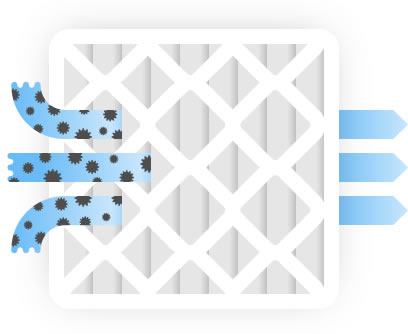
The Science Inside Air Filters
For every visible particle trapped in your furnace filter such as dirt and mold, there are as many as 100 more that you cannot see, including bacteria, fungi, and pollen.
What’s In Your Air
If not stopped, these micro particles can flow through your HVAC system and into the air you breathe. In recent years, a growing body of scientific evidence has indicated that the air within your home can be more polluted than the air outside your home. Given that so many people spend much of their time indoors – especially in the winter months – it is important to keep indoor air quality clean and fresh.Combating Harmful Micro Particles
Within your home, your heating, ventilating and air conditioning (HVAC) system is critical to purifying indoor air and pumping fresh air from the outdoors.Ventilating involves changing the air in a space in order to remove moisture, odor, smoke, heat, dust, airborne bacteria, carbon dioxide and to replenish oxygen. It is one of the most important factors in maintaining good indoor air quality in your home. Ventilation can be “mechanical” or “forced” – think of the ceiling fan in your kitchen. It can also be natural – think of opening a window on a particularly humid day. Some systems are a hybrid of both mechanical and natural processes.
The Role of Air Filters
So where do air filters come in? Whether you’re looking at DuPontTM, Arm & Hammer® or Febreze® these high-performance filters are engineered with the latest in filter media technology to trap even microscopic particles that may affect indoor air quality. By using fine sifts to filter the solid particles from the surrounding air, they make sure that only clean air reaches your lungs.Today’s high performance filters are capable of trapping micro particles, including some as small as bacteria and fungi, and are designed to last up to 90 days. Unlike some inert particles that may be trapped in your furnace/air conditioner filter, bacteria and fungi are living organisms. Under certain conditions these microorganisms can multiply on unprotected surfaces, potentially resulting in odors and adversely affecting the filter media.




 © 2009-2011. All rights reserved.
© 2009-2011. All rights reserved.